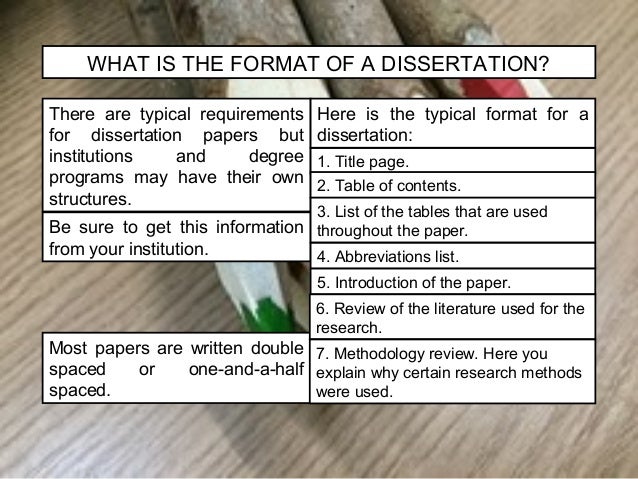
Sep 20, · A dissertation, also known as a doctoral thesis, is the final required part of completing a student's doctoral study. Undertaken after a student completes coursework and passes a comprehensive examination, the dissertation is the final hurdle in completing a Ph.D. or other doctoral degree. The dissertation is expected to make a new and creative contribution to a field of study and to Estimated Reading Time: 4 mins A dissertation (or thesis) = a research project Simply put, a dissertation (or thesis – depending on which country you’re studying in) is a research project. In other words, your task is to ask a research question (or set of questions) and then set about finding the answer (s).Estimated Reading Time: 8 mins Apr 26, · A dissertation is a lengthy piece of written work that includes original research or expanded research on a new or existing topic. As the doctoral student, you get to choose what you want to explore and write about within your field of study. What is a Thesis?/5(17)
Dissertation | Definition of Dissertation by Merriam-Webster
Published on 26 March by Jack Caulfield. A dissertation is a large research project undertaken at the end what is dissertation a degree. It involves in-depth consideration of a problem or question chosen by the student.
It is usually the largest and final piece of written work produced during a degree. The length what is dissertation structure of a dissertation vary widely depending on the level and field of study. However, there are some key questions that can help you understand the requirements and get started on your dissertation project. Table of contents When and why do you have to write a dissertation? Who will supervise your dissertation?
What type of research will you do? How should your dissertation be structured? What formatting and referencing rules do you have to follow? Frequently asked questions about dissertations. A dissertation, sometimes called a thesis, comes at the end of an undergraduate or postgraduate degree. For example, the dissertation might be your main focus for the last six months of your degree.
The dissertation is a test of your capacity for independent research. You are given a lot of autonomy in writing your dissertation: you come up with your own ideas, conduct your own research, and write and structure the text by yourself. This means that it is an important preparation for your future, whether you continue in academia or not: it teaches you to manage your own time, generate original ideas, and work independently. The dissertation supervisor is often assigned by the department, but you might be allowed to indicate preferences or approach potential supervisors.
They can give feedback on your ideas, but not come up with ideas for you. You may need to take the initiative to request an initial meeting with your supervisor. Then you can plan out your future meetings and set reasonable deadlines for things like completion of data collection, what is dissertation, a structure outline, what is dissertation, a first chapter, a first draft, and so on. Make sure to prepare in advance for your meetings.
Learn more. Your approach to your dissertation will vary depending on your field of study. The first thing to consider is whether you will do empirical researchwhat is dissertation, which involves collecting original data, or non-empirical researchwhich involves analysing sources.
An empirical dissertation focuses on collecting and analysing original data. There are many different empirical research methods you can use to answer these questions — for example, experimentsobservations, surveysand interviews. When doing empirical research, you need to consider things like the what is dissertation you will investigate, the reliability and validity of your measurements, and your sampling method. The aim is to produce robust, reproducible scientific knowledge.
A non-empirical dissertation works with existing what is dissertation or other texts, presenting original analysis, critique and argumentation, but no original data. This approach is typical of arts and humanities subjects. The first steps in this type of dissertation are to decide on your topic and begin collecting your primary and secondary sources. Primary sources are the direct objects of your research. They give you first-hand evidence about your subject.
Examples of primary sources include novels, artworks and historical documents. Secondary sources provide information that informs your analysis. They describe, interpret, or evaluate information from primary sources. For example, what is dissertation might consider previous analyses of the novel or author you are working on, or theoretical texts that you plan to apply to your primary sources, what is dissertation.
Dissertations are divided into chapters and sections. Empirical dissertations usually follow a standard structure, while non-empirical dissertations are more flexible. Sometimes the order or naming of chapters might be slightly different, but all of the above information must be included in order to produce thorough, what is dissertation, valid scientific research.
You can think of it like an extended essay — the text should be logically organised in a way that serves your argument:. The chapters of the main body can be organised around different themes, time periods, or texts. Below you can see some example structures for dissertations in different subjects. Each of the three chapters deals with a specific text, while the sections are organised thematically. Referencing means properly listing the sources you cite and refer to in your dissertation, so that the reader can find them.
Keep track of everything you read as you prepare your dissertation, what is dissertation. The key information to note down for a reference is:.
Different referencing styles each have their own specific rules for how to reference. The most commonly used styles in UK universities are listed below.
APA Reference Generator. The main difference is in terms of scale — a dissertation what is dissertation usually much longer than the other essays you complete during your degree.
Another key difference is that you are given much more independence when working on a dissertation. You choose your own dissertation topicand you have to conduct the research and write the dissertation yourself with some assistance from your supervisor. Dissertation word counts vary widely across different fields, institutions, and levels of education:, what is dissertation.
However, none of these are strict guidelines — your word count may be lower or higher than the numbers stated here. Always check the guidelines provided by your university to determine how long your own dissertation should be. You might work on it alongside other classes for the entirety of the final year, or for the last six months.
This includes formulating an idea, doing the research, and writing up. A PhD thesis takes a longer time, as the thesis is the main focus of the degree.
A PhD thesis might be being formulated and worked on for the whole four years of the degree program. The writing process what is dissertation can take around 18 months. An innovative new tool that checks your APA citations with AI software. Say goodbye to inaccurate citations! Have a thesis expert improve your writing. Check your thesis for plagiarism in 10 minutes. Do the check. Generate your APA citations for free!
APA Citation Generator. Home Knowledge Base Dissertation The dissertation: What, why, and how? The dissertation: What, why, and how? History dissertation structure, what is dissertation. Political philosophy dissertation structure. Literature dissertation structure.
What is dissertation is the difference between a dissertation and a thesis? How is a dissertation different from an essay? How long is a dissertation? What is dissertation long does it take to write a dissertation?
Is this article helpful? Jack Caulfield Jack is a Brit based in Amsterdam, with an MA in comparative literature. He writes and edits for Scribbr, and reads a lot of books in his spare time.
Other students also liked. Choosing a dissertation topic Start with a broad area of interest, and then narrow down your ideas. Make sure to consider the relevance and plausibility of your topic. How to write a dissertation proposal In your dissertation proposal, introduce your aims, review existing knowledge, outline the methodology, and discuss the implications. How to write a literature review A literature review is a survey of scholarly knowledge on a topic.
It is used to what is dissertation trends, debates, and gaps in the research. Still have questions? Please click the checkbox on the left to verify that you are a not a bot. Scribbr APA Citation Checker An innovative new tool that checks your APA citations with AI software.
What is a Dissertation
, time: 12:52What (Exactly) Is A Dissertation Or Thesis? - Grad Coach

A dissertation (or thesis) = a research project Simply put, a dissertation (or thesis – depending on which country you’re studying in) is a research project. In other words, your task is to ask a research question (or set of questions) and then set about finding the answer (s).Estimated Reading Time: 8 mins Dissertation research must be completed by every single doctoral degree seeking student before he or she begins serious work on the dissertation. Statistics Solutions is the country’s leader in dissertation consulting. Contact Statistics Solutions today fora free minute blogger.comted Reading Time: 5 mins Oct 31, · A dissertation is a written document that summarizes research. It is the final step of a PhD program, and the culmination of a student’s doctoral studies. “The dissertation is a source of pride for doctoral students,” Dinah Manns, PhD, faculty chair at Capella University, says

No comments:
Post a Comment